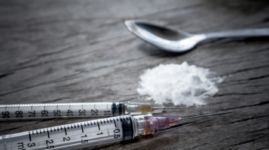Your Guide to New South Wales Heroin Laws

The use of heroin in Australia peaked in the late 1980s and early 1990s, however there are small but persistent group of users, often from marginalised backgrounds.
According to the latest national statistics just over 1% of Australians have used heroin in their lifetime and less than 0.1% have used in the past 12 months.
Here’s a summary of the laws, penalties and defences that apply to heroin-related offences in New South Wales.
What is heroin?
Heroin is an opioid derived from the poppy plant, it is a depressant which provides pain relief, relaxation, pleasure and contentment.
Heroin comes in difference forms, including:
- fine white powder.
- coarse off-white granules.
- tiny pieces of light brown ‘rock’.
Although heroin can be smoked, it is mostly commonly dissolved in water and injecting using a hypodermic needle.
Overdosing on heroin can be incredibly dangerous as its effects can slow down basic bodily functions including breathing and heart rate resulting in death.
The offence of importing or exporting heroin
The importation of heroin (a ‘border controlled drug’) is an offence under sections 307.1 (commercial quantity), 307.2 (marketable quantity) and 307.3 (any quantity) of the Criminal Code Act 1995.
To be found guilty of an importation offence, the prosecution must prove beyond a reasonable doubt that:
- A person imported heroin; and
- The person knew they were importing heroin, or was reckless as to whether or not they were importing heroin.
The term ‘import’ includes bringing the substance into Australia, as well as dealing with the drug in connection with its importation. .
If the prosecution wishes to charge a person with importing a marketable or commercial quantity of heroin, they will need to prove the existence of that quantity.
A marketable quantity of heroin is 2 grams. A commercial quantity is 1.5 kilograms.
The maximum penalties for importation offences are:
- 10 years imprisonment for importing less than a marketable quantity of heroin under section 307.3 of the Code
- 25 years imprisonment for importing more than a marketable quantity of heroin but less than a commercial quantity under section 307.2 of the Code
- Life imprisonment for importing a commercial quantity of heroin or more under section 307.1 of the Code.
The offence of manufacturing heroin
To ‘manufacture’ heroin means to to make up, prepare, produce, process (including by extracting or refining), package or label the drug.
Several offences relating to the manufacture and production of prohibited drugs (including heroin) are found under the Drug Misuse and Trafficking Act 1985 NSW. These include:
- Manufacturing or producing or knowingly taking part in the manufacture or production of a prohibited drug under section 24(1) of the Act.
- Taking part in the activities above whilst exposing a child to the manufacturing or production process, or to substances being stored for use in the manufacturing or production process under section 24(1A) of the Act.
- Manufacturing or producing or knowingly taking part in the manufacture or production of a prohibited drug which is more than the commercial quantity under section 24(2) of the Act.
- Taking part in the activities above whilst exposing a child to the manufacturing or production process, or to substances being stored for use in the manufacturing or production process under section 24(2A) of the Act.
A commercial quantity of heroin under the Drug Misuse and Trafficking Act 1985 is 250 grams, and a ‘large commercial quantity’ is 1 kilogram.
The maximum penalties for manufacture and production offences depend on the quantity of heroin manufactured of produced .
For an offence under section 24(1) of the Act, the maximum penalty is 10 years imprisonment and/or a $220,000 fine.
For an offence under section 24(2) of the Act, the maximum penalty is:
- 15 years imprisonment and/or a $385,000 fine if the heroin is more than a commercial quantity but less than a large commercial quantity.
- 20 years imprisonment and/or a $550,000 fine if the heroin is more than a large commercial quantity.
For an offence under section 24(1) of the Act, the maximum penalty is 12 years imprisonment and/or a $264,000 fine.
For the offence under section 24(2A) of the Act, the maximum penalty is:
- 18 years imprisonment and/or a $462,000 fine if the heroin is more than a commercial quantity but less than a large commercial quantity.
- 25 years imprisonment and/or a $660,000 fine if the heroin is more than a large commercial quantity.
Lesser penalties apply if the offence is capable of being tried summarily.
The offence of supplying heroin
Section 25(1) of the Drug Misuse and Trafficking Act 1985 outlines the offence of supply of a prohibited drug, which includes heroin.
Drug supply can include supplying drugs to friends without payment, sending drugs in the post, and being part of a group of people buying drugs with combined funds, selling them and splitting the proceeds. Even if a drug that you supply doesn’t contain an illicit substance, if you have represented it as an illegal drug you can still be charged and convicted of drug supply.
To prove the offence of supply in relation to heroin, the prosecution must prove beyond reasonable doubt that a person supplied heroin to another and knew, or believed at the time, the substance supplied was heroin.
The maximum penalties which apply to supply offences depend on the quantity of heroin supplied. For heroin the following distinctions are made:
- A small quantity is 1 gram.
- An indictable quantity is 5 grams.
- A commercial quantity is 250 grams.
- A large commercial quantity is 1 kilogram.
The maximum penalties which apply for an the offence of supply for heroin are:
- For less than a small quantity, a $5,500 fine and/or 2 years imprisonment if the matter is heard in the Local Court or a $220,000 fine and/or 15 years imprisonment if the matter is heard in the District Court.
- For more than a small quantity, but less than an indictable quantity, a $11,000 fine and/or 2 years imprisonment if the matter is heard in the Local Court or a $220,000 fine and/or 15 years imprisonment if the matter is heard in the District Court.
- For more than an indictable quantity, but less than a commercial quantity, a $11,000 fine and/or 2 years imprisonment if the matter is heard in the Local Court or a $220,000 fine and/or 15 years imprisonment if the matter is heard in the District Court.
- For more than a commercial quantity, but less than a large commercial quantity, a $385,000 fine and/or 20 years imprisonment.
- For more than a large commercial quantity a $550,000 fine and/or life imprisonment.
It should be noted that under section 29 of the Act, a charge of drug supply can be bought even if there is no evidence of a person actually supplying the drug.
This is known as ‘deemed supply’ and applies if a person is in possession of at least a ‘traffickable’ quantity of a drug. The traffickable quantity for heroin is 3 grams.
To rebut a charge of deemed supply, the accused must establish (on the balance of probabilities) that the drugs were possessed for reasons other than supply.
The offence of possessing heroin
Possessing a prohibited drug is an offence under section 10 of the Drug Misuse and Trafficking Act 1985 (NSW).
For heroin, this offence will apply if a person is found in possession of any quantity of the drug
The term ‘possession’ has been defined by the courts as in your ‘exclusive possession, custody or control’.
‘Exclusive possession’ requires the prosecution to exclude any reasonable possibility the drugs were not possessed by you.
The maximum penalty for drug possession is 2 years imprisonment and/or a fine of $2,200.
No offences for possessing needles or syringes or for utilising a supervised injecting facility
There are no offences which apply to:
- Possession a hypodermic needle or syringe for the purposes of injecting heroin, such as equipment obtained by a needle and syringe program.
- Attending and using heroin at a medically supervised injecting centre, such as the Kings Cross Medically Supervised Injecting Centre.
The offence of driving with heroin in your system
Drug driving is an offence under section 111 of the Road Transport Act 2013 which criminalises a person who has any detectable amount of heroin in their saliva, blood or urine whilst:
- Driving a motor vehicle; or
- Occupying the driving seat of a motor vehicle and attempting to put the motor vehicle in motion; or
- Supervising a learner driver.
The maximum penalty for this offence is:
- For a first offence, an on-the-spot driver licence suspension for 3 months and a penalty notice which is $602 at the time of writing, or an ‘automatic’ 6 month driver licence disqualification which can be reduced to 3 months and a fine of up to $2,200 if the matter is dealt with by a court, or
- For a subsequent offence, a $3,300 fine and an automatic licence disqualification for 12 months, which the court can reduce down to as low as 3 months or increase as it sees fit.
It is important to be aware that there will be no driver licence disqualification, no criminal conviction and no fine if the magistrate exercises his or her discretion to make a ‘non-conviction order‘, such as a section 10(1)(a) dismissal or a conditional release order without conviction.
There are no routine saliva tests for heroin, however the detection window for other tests for heroin in a persons’s system are:
- Up to 48 hours after the consumption of heroin for blood tests.
- Up to 2 days after the consumption of heroin for urine tests.
Detection windows may be created if a person uses multiple drugs (whether illicit or medicinal) or have medical issues which impact drug metabolism.
Going to court for an heroin-related offence?
If you are going to court for an offence relating to crystal heroin, call Sydney Criminal Lawyers 24/7 on (02) 9261 8881 to arrange a free first conference with an experienced drug defence lawyer who will advise you of your options and the best way forward, and fight for the optimal outcome.
Receive all of our articles weekly
Related Articles
RELATED LEGISLATION
- Section 11 Drug Misuse and Trafficking Act 1985 | Possession of Drug Equipment
- Section 307.2 Criminal Code Act 1995 | Importing or Exporting a Marketable Quantity of Border Controlled Drugs
- Section 307.3 Criminal Code Act 1995 | Importing or Exporting Border Controlled Drugs
- Section 307.12 Criminal Code Act 1995 | Importing or Exporting Marketable Quantity of Precursors
- Section 25 Drug Misuse and Trafficking Act 1985 | Drug Supply
- Section 10 Drug Misuse and Trafficking Act 1985 | Drug Possession
- Section 111 Road Transport Act 2013 | Drug Driving - Driving with Presence of Certain Drugs (Other than Alcohol) in Oral Fluid, Blood or Urine
- Section 24 Drug Misuse and Trafficking Act 1985 | Drug Manufacture or Production
- Section 307.1 Criminal Code Act 1995 | Importing or Exporting A Commercial Quantity of Border Controlled Drugs






